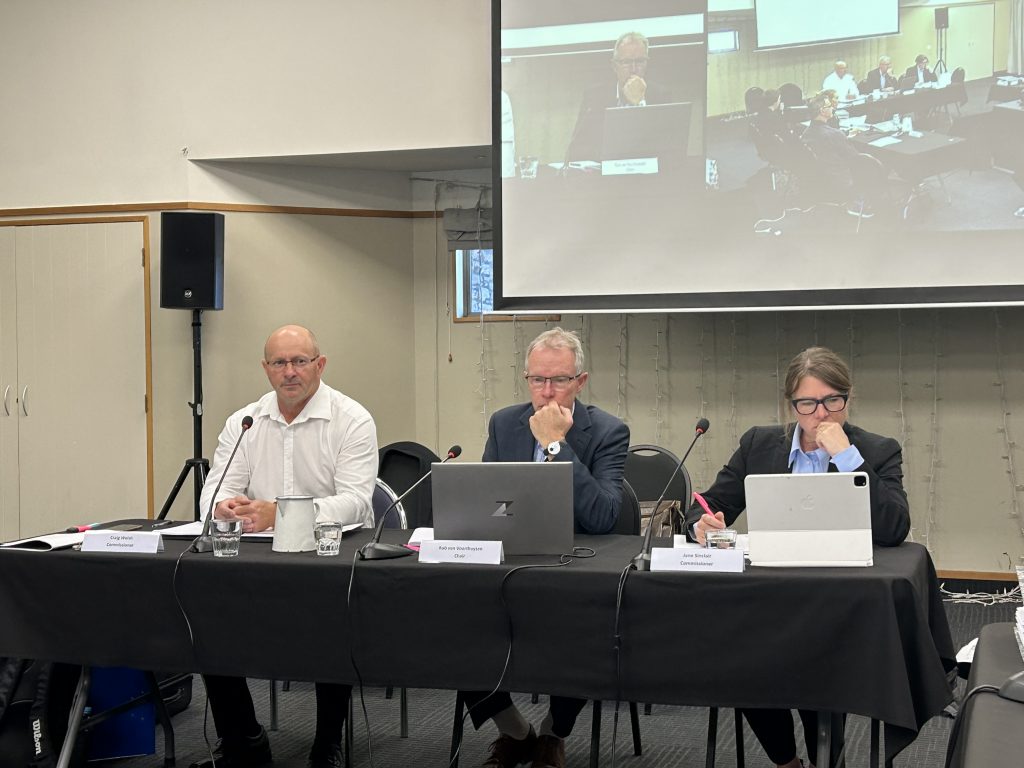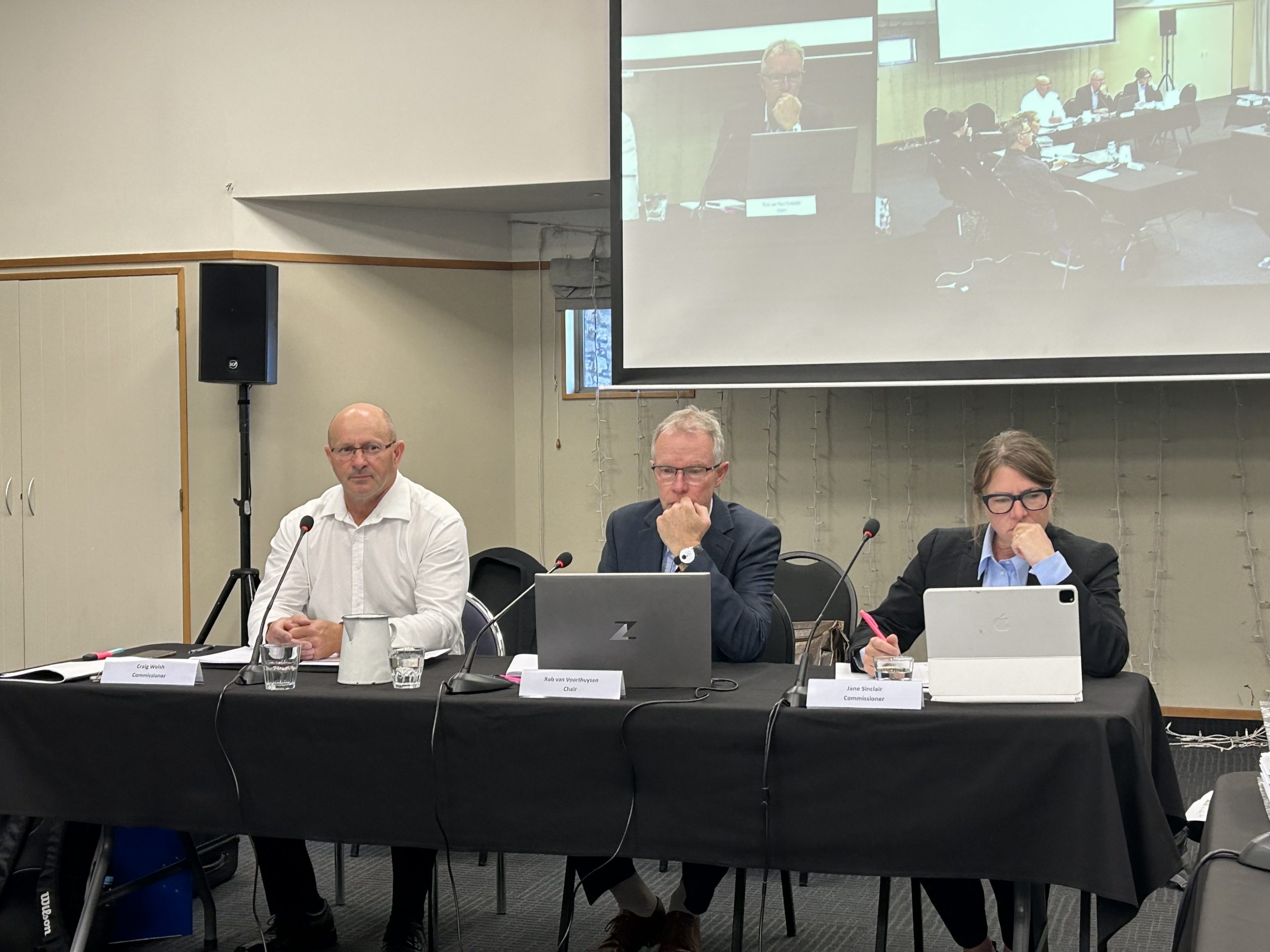Gold seekers, winery owners and former employees all had their say at a resource consent hearing in Cromwell last week which ended with questions still to be answered.
Cold Gold Clutha Ltd (CGC) is seeking consents to suctionmine for gold on the Upper Clutha River from the Luggate Bridge to the confluence of the Clutha and Lindis Rivers — about 23km.
The hearing was in front of commissioners Craig Welsh, of Nelson, Rob van Voorthuysen (chairman), of Napier, and Jane Sinclair, of Queenstown. Consents were required from the Otago Regional Council, the Central Otago District Council and the Queenstown Lakes District Council.
The company had consents to dredge between Roxburgh Dam and Tuapeka Mouth, which were re-consented this year until 2035, authorising mining over more than 900ha of riverbed.
The dredge is a self-powered steel pontoon catamaran 23.9m long with a beam of 6.6m. It is a suction-type dredge which uses hydraulically driven highpressure water pumps to create suction on the river bottom and send river gravel through a 350mm pipe on to the dredge.
CGC director Peter Hall said gold was needed for fine jewellery as well as for lowcarbon alternatives to fossil fuels.
Its counsel Bridget Irving offered conditions of CODC and QLDC consents to mitigate concerns raised about the operation, including monitoring noise levels and reducing light spill.
Māori Point Wines and Vineyard owners Marilyn Duxson and John Harris live beside the river reserve next to the Clutha River.
Dr Duxson strongly disagreed that the effect would be ‘‘no more than minor’’ as the applicants submitted.
The ‘‘constant thrum of industrial noise’’ coming from the dredge would have a major effect on their environment, she said.
She was concerned by the ‘‘slight nature of the evidence’’ in the environmental report commissioned by the applicants and had sought advice from freshwater scientist Roger Young, of the Cawthron Institute in Nelson.
Dr Young said the river was lake-fed and stayed clear even after rainfall.
The sediment disturbed by dredging had been undisturbed for a long period. Disturbing that would affect the ecological and aesthetic values. A bloom was likely downstream of the dredging, he said.
However, Dr Young’s assertion about the river being lake-fed was contested by Babbage Consultants technical director Treffery Barnett.

In response to questions from Mr van Voorthuysen, Ms Barnett said Dr Young had placed an overemphasis on the primary source of the Clutha River being Lake Wānaka.
There were multiple tributaries in the area where CGC would work all affecting the water quality, she said.
‘‘It’s not quite as pristine an environment as portrayed by Dr Young.’’
Former employees of CGC claimed there were significant environmental problems with company’s current operation, including discharging human waste directly into the Clutha River.
Certified marine engineer and skipper Reginald Hill said he had worked for the company and director Peter Hall about a decade ago.
When he recently met fellow submitter and former CGC employee Oliver Moon, he was very surprised to hear the environmental shortfalls on the dredge had not improved, he said.
The two-stroke engines CGC used were ‘‘dirty, noisy engines’’.
The dredge would burn about 21,000 litres of diesel oil a month, and fuel was pumped on to the jetboat at the rivers edge and then off to the dredge — 104 transfers on or next to the river each month.
In more than 10 years of operation, CGC had never reported a fuel spill, Mr Hill said.
The dredge was fitted with a basic motorhome type toilet and while he was on board, crew urinated directly into the river.
At the end of each shift, faeces from the toilet cassette were emptied into the river.
It was the only commercial vessel he had ever operated on that did not have a sewage holding tank or treatment plant.
Mr van Voorthuysen asked CGC to explain why there was no sewage holding tank on the vessel.
Mr Moon confirmed the toilet situation was the same when he worked on the dredge.
ORC consultant planner Josie Burrows and CODC and QLDC consultant planner Kirstyn Royce both recommended the consents be declined and had not changed their opinions at the end of the three days of hearing.
Concerns remained for the planners around the effect on wāhi tūpuna (significant sites) and ara tawhito (traditional travel routes), values, safety of other water users around the dredges anchor lines and protecting birds in the vicinity.
Aukaha senior planner Tim Vial said the concerns he raised about the effect on wāhi tūpuna and ara tawhito values were not raised by CGC planner Daryl Sycamore in a subsequent meeting or follow-up email.
The hearing was adjourned and Mr van Voorthuysen asked for an update from Ms Irving in two weeks on the timeframe for information requested by the commissioners.





